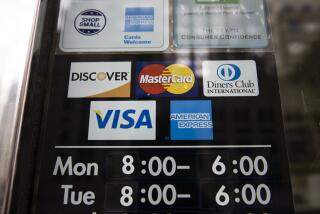Food for Thought on Credit Cards
- Share via
People with major credit cards--Visa, MasterCard or Discover--can now run into some local supermarkets and charge a quart of milk.
This is a big advance for both consumers and supermarkets, say the credit card networks, which are pushing more grocers to sign up. The consumer gets yet another payment system, the more the merrier. The markets get yet another chance to make a sale.
Actually, the credit card industry may benefit most of all, perhaps to the detriment of consumers. Consumers already have payment systems enough. And there’s an instinctive feeling among many consumers that people shouldn’t even think of buying basic necessities on credit.
These are troubled times for the credit card industry as for everyone else, what with card use decreasing and delinquencies increasing. “In a recession, more people pay off their debt,” says Spencer Nilson, whose Santa Monica-based Nilson Report tracks the credit card industry. And “of those who usually revolve, 80% pay off, and 20% go more into debt.”
Casting about for new markets, the card industry has gone into movie tickets, airport parking lots and fast food. Supermarkets look even better, given industrywide sales last year of more than $270 billion, and the greatest volume of transactions in retailing.
The supermarkets may not be an easy sell. The setup, including terminals at every checkout, is a significant investment. The industry, moreover, has always moaned about its thin profit margins--too thin to accommodate a typical transaction cost of 2% on every credit card purchase.
MasterCard and Visa have answers. Both have temporarily cut their “interchange” rate to 1%, so the banks can charge merchants less than 2% to handle their billings. Credit card transactions, Visa says, are also more cost efficient, taking only 20 seconds to process at a checkout, compared to 90 seconds for handling checks. And markets will reduce their losses from bounced checks: Even when consumers are delinquent on their credit card payments, their banks guarantee to pay the merchants.
Less sure are potential sales and profits. MasterCard’s limited tracking at stores already accepting credit cards showed an 8% increase in overall sales, a 3% increase in the number of transactions and an average card transaction of $46--no more than the average check purchase ($46.70). But the offer of credit is expected to “make it easier for customers to buy high ticket merchandise,” says Robert S. Newman, MasterCard’s vice president for merchant development.
Actually, consumers may not be such an easy sell on credit cards either, although half the respondents in a Visa poll said they’d like to pay electronically, about half of them on credit cards. Like the merchants, they’ll get convenience, flexibility and save time. They even get an extra fillip with certain credit cards, says Al Marasca, executive vice president of retail for Los Angeles-based Ralphs Grocery Co. Their grocery expenditures can now count toward frequent-flier miles and other card usage incentives.
Unfortunately, the service credit cards offer is loaded. Financial flexibility is not a gift to all consumers.
To the so-called convenience user (about a third of active card-users), who pays his bill in full every month, it’s just a charge card, offering the efficiency of a single payment for multiple purchases. To the “revolver,” who carries balances from month to month, it’s a variable loan and not an easy one to manage. It gives them a way to buy if and when they don’t have the money--an ability, in Visa’s words, “to deal with fluctuations in their cash flow.”
“Credit cards create what I call soft walls,” says financial planner Robert Ortalda Jr., in Redwood City, Calif. “When you deal with money, and you’re out of it, you run up against a hard wall. With credit cards, no one and nothing tells you to stop. You have to be more disciplined, providing your own management.”
Given discipline, credit cards are what Visa U.S.A. spokesman Debbe Stern calls a “good financial management tool: By the end of the month, you know exactly what you spent on food, for example.” For some people, financial feedback that comes in only once a month would be a disaster.
The idea of buying food on credit strikes a lot of people as particularly dangerous, especially if one does it because he has to--a sure sign of trouble. “You should pay cash for the basic necessities,” Nilson says. Even the advertising suggests, Ortalda says, that credit cards are for discretionary purchases, “for those times when you see an antique clock, and don’t have the money for it, but won’t worry about that now. Stretch now, worry later.
“But if you do that with food, which isn’t a one-time purchase, and has to be bought next week as well,” he says, “you’re in trouble.” It’s not something one can do without.
Using the cards at supermarkets is only an option, of course. We can’t blame the credit card industry if there are some dangers with the convenience.
“I like the option,” one food shopper says. “I’m a grown-up; I can handle it.”
More to Read
Inside the business of entertainment
The Wide Shot brings you news, analysis and insights on everything from streaming wars to production — and what it all means for the future.
You may occasionally receive promotional content from the Los Angeles Times.










